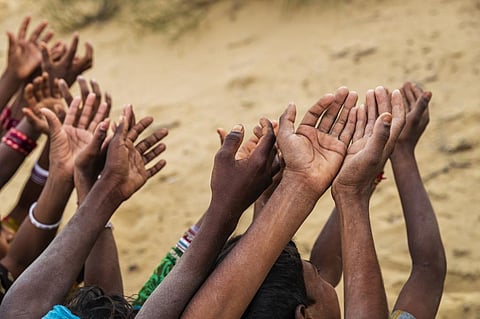

Over a quarter of a billion people will be pushed into poverty in 2022, according to a new report by Oxfam, a global network of charitable organisations. The worldwide financial crisis will be mainly driven by the price inflation due to Russia’s invasion of Ukraine and economic crisis caused by the COVID-19 pandemic, it said.
The convergence of these two events is also widening the gap between the rich and the poor at an unprecedented rate: Nearly half of the global population (3.3 billion) are living below the poverty line, while a new person becomes a billionaire every 26 hours since the beginning of the pandemic.
The Oxfam estimates are based on World Bank projections and earlier research by the World Bank and Center for Global Development. The report was released April 12, 2022, ahead of the spring meetings of World Bank and the International Monetary Fund.
The report noted:
The combined impact of COVID-19, inequality and food price hikes could result in 263 million more people living in extreme poverty this year, resulting in a total of 860 million people living below the $1.90 (Rs 144.7) a day extreme poverty line. This would be an extraordinarily damaging rise that reverses decades of progress in the fight against poverty.
The pandemic resulted in people losing their jobs and savings, while they are faced with a greater food price inflation than the 2011 crisis. In comparison, billionaires continue to make money, as they exploit an “inflationary environment to boost profits at consumers’ expense”, the report said.
Oil companies are making record profits with soaring energy prices and margins “while investors expect agriculture companies to rapidly become more profitable as food prices spiral,” it noted.
The fortunes of 10 of the richest people in the world have doubled during the pandemic, the Oxfam analysis showed. At the same time, some 2,744 small billionaires have recorded an unprecedented rise in fortunes compared to the last 14 years, the report said. These 14 years were already a bonanza for billionaire wealth, it added.
The increasing poverty is not spread evenly across geographies, according to the data. Food costs account for 40 per cent of consumer spending in sub-Saharan African nations, while the same figure is half for those living in advanced economies.
Developing nations, which were already faced with a worrying fiscal condition, are now witnessing debt levels unseen so far.
An estimated debt servicing amounting to $43 billion in 2022 for the world’s poorest countries is needed, the authors highlighted.
The international body urged world leaders attending the upcoming meeting to follow a five-pronged economic rescue plan to evade what is sure to be a catastrophic:
First, cuts in value-added taxes on staple food and cash transfers to support income should be implemented to protect the poorest from inflation.
Second, World Bank and IMF should cancel debt payments for 2022 and 2023 for low and lower-middle-income countries.
Third, a 2 per cent tax on personal wealth above $5 million, 3 per cent for wealth above $50 million and 5 per cent for wealth above $1 billion should be imposed. This could amount to $2.52 trillion — enough to save 2.3 billion people from poverty.
Fourth, Special Drawing Rights under the IMF should be reallocated to ensure it is debt- and conditionality-free.
Fifth, emergency support provided to lower-income countries should be increased.